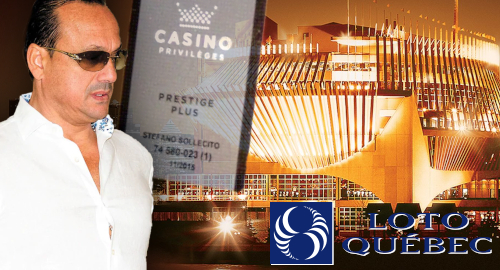 Quebec’s provincial gambling monopoly is refuting allegations that its casinos are facilitating money laundering by organized crime figures.
Quebec’s provincial gambling monopoly is refuting allegations that its casinos are facilitating money laundering by organized crime figures.
Le Journal de Montreal issued a series of reports this week alleging that the Casino de Montreal had “rolled out the red carpet” for multiple individuals linked to organized crime, including Stefano Sollecito, a reputed mafia figure who gambled millions at the casino despite declaring annual revenue in the mid-five-figure range to Canadian tax authorities.
The reports claim that Sollecito (pictured) and other crime figures have been showered with perks by Loto Quebec-managed casinos, including comped hotel rooms, restaurant meals, concert tickets and rounds of golf. Figures like Sollecito were members of the Casino de Montreal’s rewards program and were granted access to its swankiest VIP lounges.
A 2019 report by Criminal Intelligence Service Canada (CISC) pegged the gambling sector as the country’s third-most popular means for organized crime to launder proceeds of illicit activity, behind only private businesses and underground banking operations.
CISC claimed that around 10% of Canada’s 176 identified organized crime groups used casinos to launder dirty cash, with British Columbia’s casino sector cited as particularly popular with alleged crime figures looking to legitimize their ill-gotten gains.
Le Journal claimed Loto-Quebec declined to comment on the paper’s reporting by “hiding behind the Privacy Act.” The government-run entity issued a statement Thursday saying it was “obliged to decline” these requests for comment because it “cannot divulge any personal information, nor report on the actions that may have been taken to deal with specific individuals who frequent public places like casinos.”
Loto-Quebec further claimed that it “actively works with various stakeholders” in combating money laundering and “complies with all regulatory requirements” regarding suspicious transactions. Loto-Quebec said the federal Financial Transactions and Reports Analysis Centre (FINTRAC) found “no issues” with the monopoly’s compliance program.
As for the perks doled out to the individuals in the media report, Loto-Quebec noted that its Casino Privilèges program was open to anyone who wished to join and that the perks represented “rewards – not gifts – which are self-funded by [players’] own restaurant and gaming activities.”
Loto-Quebec is in the enviable position of acting as both gambling operator and regulating its gambling operations, a contradictory dual-role that generally betrays the people it’s intended to benefit. It remains to be seen whether Quebec will eventually come to the same conclusion as its BC counterparts, who are set to finally get some adults in the room next spring.
Most of Loto-Quebec’s retail gambling operations are currently suspended for the second time this year due to the province’s COVID-19 resurgence. The closures have dealt a significant blow to the monopoly’s earning power, and while its Espacejeux online gambling operation is thriving, it can’t fully compensate for the land-based losses.





